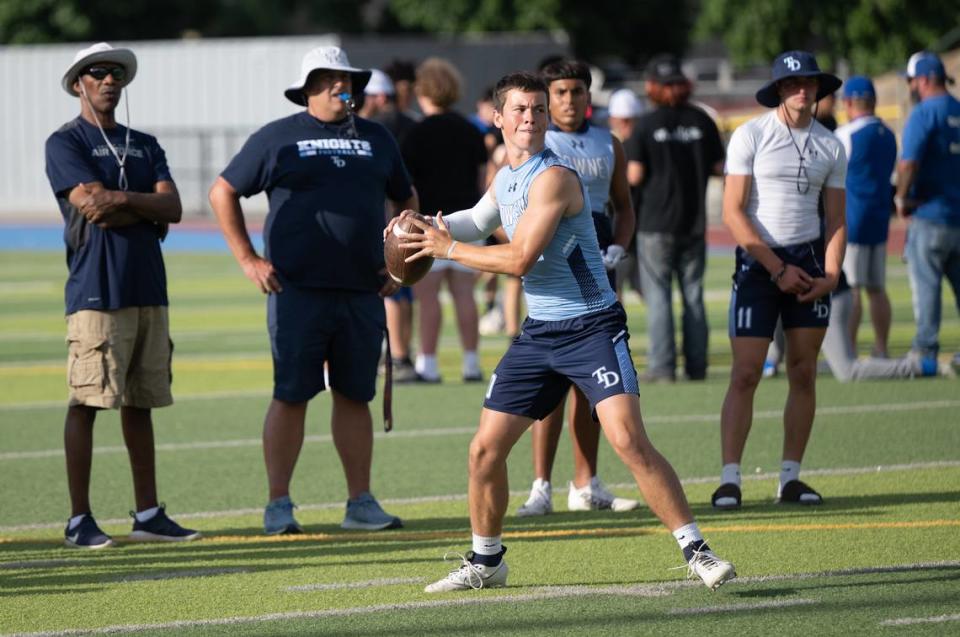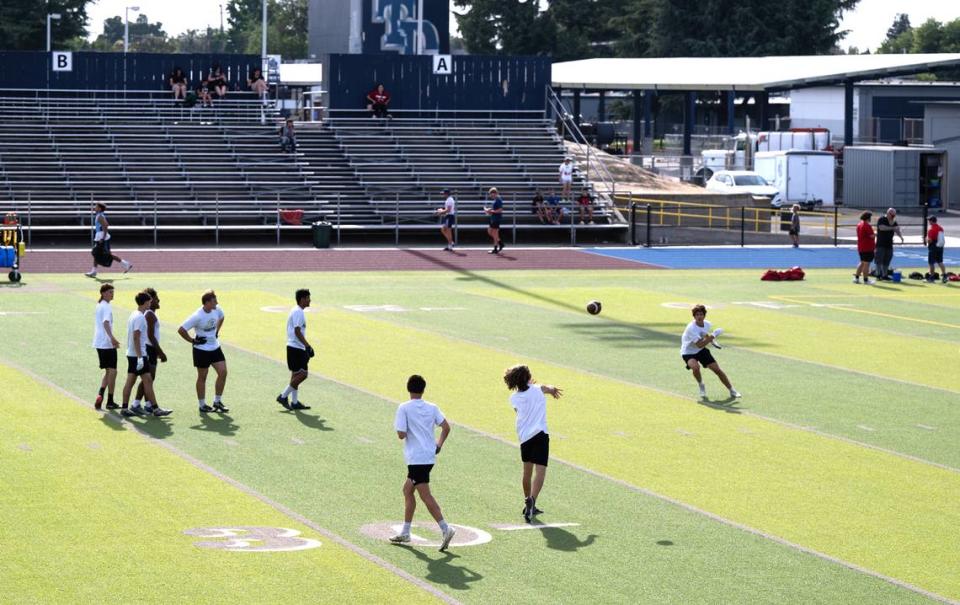Stanislaus football teams participate in off-season passing leagues. How much do they help?
Sac-Joaquin Section football teams are wrapping up a month of summer workouts this week as they prepare for the section-mandated dead period of July 3-24.
To avoid the monotony of daily practice, a number of local teams spent a few days each week competing in 7-on-7 passing-league events, which have taken over the summer football scene in recent years.
Some coaches took their teams to round-robin events with up to 10 schools in attendance, while others opted for one-on-one events with their school and one other. Many teams attended local events hosted at high schools, and some added in a few events at Division I colleges like Cal Poly, Fresno State, UC Davis and others during the monthlong summer practice period.
We asked a few local coaches to share their thoughts, good and bad, on the growing trend of 7-on-7 off-season football.
Here are their answers, lightly edited for clarity:
Shaun King, Hughson
It works both ways. The defense knows you’re throwing the ball so it makes it more difficult for our passing routes. Defensively, we’re working against multiple formations, which helps us out throughout the year. Third, it’s competition. All we do in the summer is competition — we want to compete and become a team. Our philosophy is the more (competition) the better.
Jeremy Plaa, Downey
There’s not many other things where we can get competitive reps against another team. It forces you to work harder in practice on a daily basis. We film it, like with regular practices, we’ll watch it and see where we can get better.
This is vital for us … and some teams are out here working on their third-down offense. For us, (passing) is an every down thing, for other schools, it might just be a “passing down” type of thing.

Eric Reza, Pitman
I think it’s beneficial as long as you use it as a learning tool. Sometimes we film it and break it down to see the timing and see if the guys are picking up the patterns and see if there are things we need to adjust.
Tracey Traub, Enochs
It helps our guys get that edge of competitiveness and we can see where they’re at. That’s what I really like about 7-on-7. What I don’t like is it can give you a false sense of security. You can think you’re this bomb passing team or defense, but you have to be able to defend the run, too.
Rob Cozart, Patterson
I think 7-on-7 definitely has a place in off-season football. How you go about it is going to determine what you get out of it. Some groups will run 7-on-7 circuits with formations they won’t run all year on the offensive side. On the defensive side, we used to do a lot of 7-on-7’s and passing leagues, but we started running a defense that used a lot of blitzing and we were focusing on our pass rush, which you’re not going to get in a 7-on-7, so we went away from it.
We just started getting back into it to stay fresh in the off-season and stick with ball skills and agility in case we wanted to install some stuff or make some tweaks.
Lamar Wallace, Gregori
It’s more of a defensive focus for us. But offensively, it’s good for quarterbacks to go through their reads and receivers to find open space. For me, it’s all about format. Tournaments, I’m not huge on those. I do like going one-on-one with another team where you have the opportunity to change the situations and coach the kids up in between reps. It has its pros and cons. I’m not against it, but I’m not going to base my whole summer around it, either.
Trevor Mew, Davis
I think there’s good things and bad things about it. It’s great to get out and give the kids a chance to compete, but a lot of times it’s unrealistic on what teams will do defensively and sometimes offensively. But it’s a chance for the kids to get out and compete and learn the system and get to know each other instead of going through drill after drill.
Roger Canepa, Central Catholic
I’m not a big 7-on-7 guy. I tell my guys all the time, it’s not football, but it’s good for the DBs to work on pass coverage. I told my guys we were 0-6 in 7-on-7’s when we won our first state title because it’s not real football.
I’ve always been old school. It’s good for the quarterbacks, receivers, timing and the secondary, but are you going to win football games because you do 7-on-7’s? I personally don’t think so.
Andrew Beam, Escalon
We’ve come to really embrace summer 7-on-7’s. It allows our guys to play against some high-quality, athletic teams where we can practice live situations without defensive backs and linebackers. It gets kids excited for summer instead of just going to practice every day.
When we practice during the summer, we’re working on our run game, which is 80% of our offense, but when we get to these 7-on-7’s, we get to work on some things we’re not as good at, which includes throwing the ball out of the spread and covering empty formations that we’re going to see this year with some of the teams we play.

Derrick Goblirsch, Central Valley
I like it. For us, the main thing is competition against other schools. It’s not a negative, but also it’s not football, it’s a tool we use. I like it, but it’s not a real game and that’s the message. Whether we have a good day or a bad day, the message stays the same: This isn’t how it’s going to be in a game and we have to continue to get better.
Dylan Miller, Modesto
As coaches, we’ve got to be detailed about what we participate in. You’ve got to suit the needs of your program. On our end, we’re detailed in which ones we do. We participate in ones where we can reset a drill or reset a formation so that we make sure we’re teaching, I think that’s where the most value is at this time of year.
In the past few years, we’ve gravitated to the one-on-ones, where we get a more controlled environment. I see the value of both the round-robin format and the one-on-ones. I don’t think there’s a wrong way to do it, it’s just whatever suits your program in a given year.

